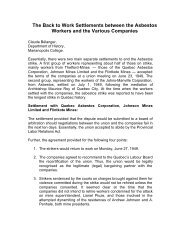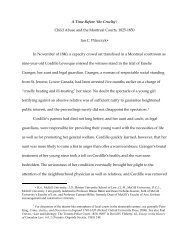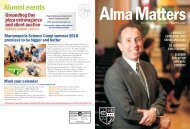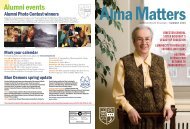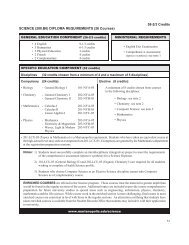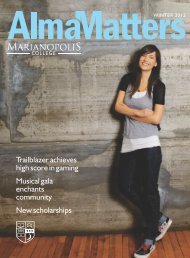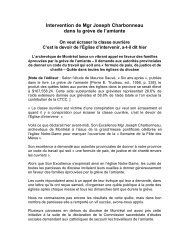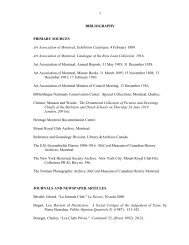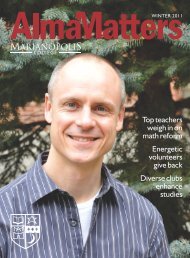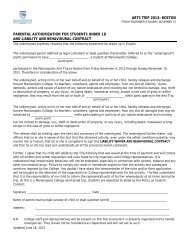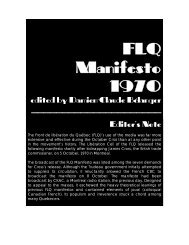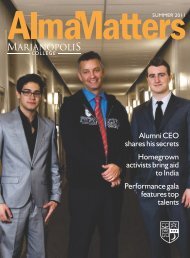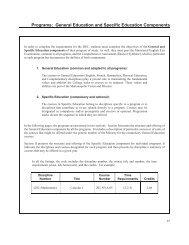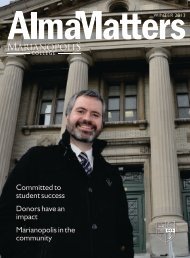Arts and Sciences: English - HumanitiesGeneral EducationComponentIn Arts and Sciences, the English andhumanities courses belong both to theGeneral and Specific components ofthe program. As General Education,they respect the standards andobjectives common to all otherofferings in these categories. AsSpecific Education, the courses sharea Great Works objective and presentin some depth twenty significantliterary and philosophical works,in context, mainly from the westerncanon. Because of this objective, thecourses are required of all studentsin the program.EnglishThe English offerings reinforce thevalue of the narrative mode, callingon students to learn mainly throughtheir direct experience of literarytexts. As part of the aim of fosteringinteraction with students in otherprograms when appropriate, theseclasses will be taken with students inLiberal Arts.Introduction to College English603-701-MS (2-2-4) 2.66 creditsThis course introduces students topre-classical and classical works intranslation, including selections fromThe Iliad and The Odyssey, andcertain Greek tragedies. It alsoinitiates a process that continues overfour semesters of recognizing literarythemes and techniques in historicaland philosophical contexts, and ofbeing able to speak and write clearlyand effectively about them. Theacademic essay is a special featureof this course.Literary Works I: English LiterarySurvey to 1800603-702-MS (2-2-3) 2.33 creditsDrawing on material from the earlymedieval Beowulf to The CanterburyTales, Sir Gawain and the GreenKnight, and Everyman, the course alsoconsiders Marlowe's Doctor Faustus,Shakespeare's The Tempest andsometimes Milton’s Paradise Lost. Itsframework is to explore developmentsin the genres of epic, romance, anddrama. The course builds on thereading comprehension and structuredwriting of Term 1 and offers practice inwriting a well-crafted, longer essay.Literary Works II: EnglishLiterary Survey Since 1800603-703-MS (2-2-3) 2.33 creditsIn order to provide the student witha sense of the literary tradition inEngland, the reading in this courseis extensive and diverse, coveringpoetry, fiction, drama, and criticalthought. The course also examinesmajor Romantic and Victorianliterary figures from Blake to Wilde.Throughout the semester, students aregiven exercises and sample essaytasks to prepare them for the EnglishExit Exam.Literary Works III: Modernismand Critical Theory (Seminar)603-704-MS (2-2-2) 2 creditsThis course focuses on the period ofliterature (1900-1960) known asModernism and on different genres(poetry, fiction, drama, the novel)representative of that period. Studentswill look at works by some of the bestknown modernist authors (Eliot,Joyce, Woolf, Hemingway, andothers) who came to define the ethosof their era. In addition, students aretaught to apply elements of criticaltheory (such as New Criticism,Psychoanalytic Theory, Marxism,Feminism, and Structuralism) as themode of discourse for their seminarsand critical essays.HumanitiesThe humanities courses tend to usethe more familiar model of findingand verifying evidence, establishingrelationships, propositions, hypotheses,etc. Over three semesters, thecourses will help to establish commonground for identifying, comparingand evaluating assumptions made inthe Arts, Sciences, and SocialSciences. Much of the connecting withother courses and preparing for theIntegrative Project should happennaturally within this centralhumanities experience.Knowledge and its Application345-701-MS (2-1-3) 2 credits- 3 hours of class- 3 hours of homeworkWays of KnowingThis course uses the storyline anddiscussions in Robert Pirsig’s novel,Zen and the Art of MotorcycleMaintenance, as a starting point toexplore the nature of human knowledge,and the connections that existbetween our views on knowledge andour values—even our sense of reality.In the course of their explorationsstudents have the opportunity toexamine the perspectives of bothEastern and Western philosophy,as well as the tension between thescientific and the creative/aestheticattitude – a tension which has beena pervasive undercurrent in thedevelopment of contemporaryculture.96
Arts and Sciences: HumanitiesWorld Views345-702-MS (3-0-3) 2 credits- 3 hours of class- 3 hours of homeworkShifting Visions of the CosmosA world view is a construct thatreflects and informs our attitudetoward reality – i.e. our view ofnature, of society and (mostimportantly) of ourselves and whatour relation is to everything else. Inthis course we first consider thenature of a world view – what it is,how it gets created and changed, andwhat it does. Then, we use that as abasis for examining the major worldviews that have been dominant in thedevelopment of Western civilization:ancient, medieval, modern and contemporary.Our goal is to see how theseworld views have both shaped – andbeen shaped by – the great achievementsand events in western history.Tattoos, Trophies and T-cellsIn this course we look at conceptsof the body in various cultures anderas. Based on descriptions of illness,healing, sports, the arts, and religiousrituals, the class discusses how worldviews are reflected in the ways wetreat, use, and experience our bodies.We also ask how these views andpractices differ according to aperson’s social or economic position.By examining conceptions of thebody, the students come to a greaterunderstanding of how a world viewshapes our daily experiences and oursense of self.Aboriginal Cultures in CanadaCanadian Aboriginal peoples arepresently facing critical issuessurrounding the struggle for thesurvival of their various culturalidentities. This course focuses onstudying Aboriginal worldviewsthrough an appreciation of culture.Students study representative groupsfrom each region of Canada(including Eastern Woodlands,Plains, Northwest Coast, and Arctic),with an emphasis placed on aspects ofFirst Nations, Metis and Inuit culturesuch as material culture, traditionalbelief systems, creation stories, andsocial structure. The course alsoaddresses historical and contemporaryAboriginal issues, from land claims toself-government to resource rights.Connections are made withindigenous peoples in other parts ofthe world as a way of addressingcommon issues and questionsregarding indigenous peoples’ rights.Architecture—A World ViewThis course incorporates ideasdrawn from a variety of disciplinesto present architecture as a form ofcultural expression. The ideas heldby patrons, architects and buildersabout what buildings should do,how they should look, and howpeople should behave within themare conditioned by their world views.By comparing these world viewswith actual buildings, studentsrecognize how, in different timesand places, the ways people organizespace and impose different orderson the natural world reflect specificnotions of human existence in thelarger scheme of things.Ethics345-704-MS (3-0-3) 2 credits- 3 hours of class- 3 hours of homeworkIndividual Ethics, GrandConspiracies and Half TruthsMaking ethical decisions is a processthat depends on having complete andaccurate information about the issuesat hand. When information iswithheld, altered, or fabricated, theprocess becomes much more difficult.We are left in a position where ethicaldecisions are impossible to make. Weare forced to seek more information.The challenge lies in determiningwhat, from among available information,is accurate and relevant. Thiscourse considers the problem ofmaking personal ethical decisionsin the face of the flood of (oftencontradictory) information providedby governments on one hand and bythe critics on the other. The coursecovers a range of events that providematerial for spin-doctors and conspiracytheorists alike, with an eyealways on the ways the informationavailable from both sides impacts onindividuals. We will ask whether ourpersonal responses to life’s issues areinfluenced more by those who claimto have our best interests at heart orthose who claim to offer the truth.Ethical Issues in Human SexualityContemporary life is animated by abewildering array of sexuality issues.Ethical controversies as diverse assexism in language, pornography andsadomasochism have changed sexualpolitics forever. This course exploresthese and other issues in the attemptto achieve some clarity concerningtheir ethical dimensions.97
- Page 2 and 3:
VISIONMarianopolis College, drawing
- Page 4 and 5:
GENERAL INFORMATION: Introduction t
- Page 6 and 7:
AdmissionsOUT-OF-PROVINCEAPPLICANTS
- Page 8 and 9:
Financial Information• Birks Fami
- Page 10 and 11:
Financial InformationConfirmation F
- Page 12 and 13:
Academic Information• Failure (EC
- Page 14 and 15:
Academic InformationThose who are a
- Page 16 and 17:
Rules and Regulationsand whether su
- Page 18 and 19:
EDUCATIONAL RESOURCES & SERVICESAss
- Page 20 and 21:
Educational Resources and ServicesS
- Page 22 and 23:
CHOOSING A PROGRAMDiploma Programs
- Page 24 and 25:
CertificatesSpecial InterestCertifi
- Page 26 and 27:
Programs: General Education and Spe
- Page 28 and 29:
General EducationGENERAL EDUCATION
- Page 30 and 31:
General Education: Englishidentifyi
- Page 32 and 33:
General Education: Englishas the fi
- Page 34 and 35:
General Education: Englishintended
- Page 36 and 37:
General Education: Frenchand curren
- Page 38 and 39:
General Education: Frenchce cours t
- Page 40 and 41:
General Education: HumanitiesHumani
- Page 42 and 43:
General Education: Humanitiesunders
- Page 44 and 45:
General Education: Humanitiespracti
- Page 46 and 47:
General Education: Humanitiespracti
- Page 48 and 49: General Education: Physical Educati
- Page 50 and 51: General Education: ComplementaryCom
- Page 52 and 53: General Education: ComplementaryMod
- Page 54 and 55: SECTSpecificEducation Component- Sc
- Page 56 and 57: Science: Biology - ChemistryBiology
- Page 58 and 59: Science: Mathematics - PhysicsR and
- Page 60 and 61: 56-2/3 to 58 CreditsSOCIAL SCIENCE
- Page 62 and 63: Social Science: Profiles - General
- Page 64 and 65: Social Science: Psychology ProfileE
- Page 66 and 67: Social Science: Law, Society and Ju
- Page 68 and 69: Social Science: Honours CommerceHon
- Page 70 and 71: Social Science: Anthropology - Biol
- Page 72 and 73: Social Science: History - Mathemati
- Page 74 and 75: Social Science: Political Sciencedi
- Page 76 and 77: Social Science: Religion - Sociolog
- Page 78 and 79: 54-2/3 CreditsCREATIVE ARTS, LITERA
- Page 80 and 81: Creative Arts, Literature and Langu
- Page 82 and 83: Creative Arts, Literature and Langu
- Page 84 and 85: Creative Arts, Literature and Langu
- Page 86 and 87: Creative Arts, Literature and Langu
- Page 88 and 89: Creative Arts, Literature and Langu
- Page 90 and 91: Creative Arts, Literature and Langu
- Page 92 and 93: 58-2/3 CreditsMUSIC (501.A0) DIPLOM
- Page 94 and 95: MusicEar Training and Theory IV551-
- Page 96 and 97: 59-1/3 CreditsARTS AND SCIENCES (70
- Page 100 and 101: Arts and Sciences: Art History - Ar
- Page 102 and 103: Arts and Sciences: Mathematics - Mu
- Page 104 and 105: Arts and Sciences: Multidisciplinar
- Page 106 and 107: 56-2/3 to 58 CreditsLIBERAL ARTS (7
- Page 108 and 109: Liberal Artsof evolution; the first
- Page 110 and 111: Liberal ArtsOptionalIn addition to
- Page 112 and 113: Teaching FacultyFLEISCHER, George T
- Page 114 and 115: Teaching FacultyTRILLER, Bernice Sh
- Page 116: INDEX II: Programs and CoursesGener



